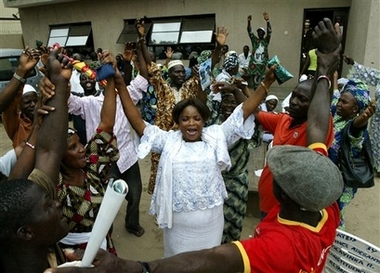Nigerian ruling party wins presidency
(AP)Updated: 2007-04-24 11:19
ABUJA, Nigeria - A former chemistry professor hand-picked by President Olusegun Obasanjo won Nigeria's presidential election in a landslide Monday, a vote denounced as deeply flawed by international observers and the opposition.
 Supporters of Umaru Yar'Adua celebrate outside the Lagos headquarters of the People's Democratic Party in Lagos, Nigeria, Monday, April 23, 2007. [AP]  |
Yar'Adua, a 56-year-old Muslim from the north of a country of 140 million people nearly equally split between northern Muslims and southern Christians, has spent most of his working life in academia, teaching chemistry at a university in his home state.
Though he favors crisp Muslim robes and caps and presided over a state where Islamic law is practiced, he is not seen as a hard-liner or especially strong supporter of Islamic law. Yar'Adua has vowed to follow the program of Obasanjo, a southern Christian, which includes privatization and opposition to spreading Islamic law outside the north or implementing stringent punishments, like amputations and death for adulterers, in the north.
Gen. Muhammadu Buhari, the 1980s-era military leader who was the runner-up in Saturday's vote, called the outcome "the most blatantly rigged election results ever produced in Nigeria."
During Saturday's presidential and parliamentary votes and a week earlier during elections for state governors and legislatures, electoral officials could be seen inking ballots and shoving them into boxes. Thugs intimidated voters. The presidential ballots bore no serial numbers, making them easy to mishandle and impossible to track.
In the United States, which counts on Nigeria as a top supplier of oil, the White House expressed concern about reports of election irregularities. "Obviously, there is a lot of tension there and we hope that people can remain calm, and if they're going to protest, do so peacefully," said Dana Perino, the White House deputy press secretary.
State Department spokesman Sean McCormack said: "Based on the reports that we have seen, these were flawed elections and in some cases deeply flawed elections."
Yar'Adua rejected the rigging allegations as not "based on fact." But he sought reconciliation with the opposition candidates.
"I have extended a hand of friendship to all my colleagues who contested with me," he said in a nationally televised news conference.
Oil prices rose Monday, in part because of concern about Nigeria. Still, widespread and immediate violent reaction appeared unlikely: While Nigerians are frustrated with the state of their democracy, fear of security forces was likely to mute any response.
Electoral commission Chairman Maurice Iwu said Yar'Adua won about 24.6 million votes, more than three times the number garnered by Buhari. Some 61 million Nigerians registered to vote. Iwu gave no turnout figures.
In a nationwide address ahead of Monday's announcement of the election results, Obasanjo accused the political opposition of "fanning the embers of hate" and engaging in "outright subversive activities."
Obasanjo, barred from running by term limits, acknowledged that the vote was imperfect, but said Nigerians were nonetheless devoted to democracy. He said losers should redress grievances through the courts.
That was exactly the plan, said representatives of Vice President Atiku Abubakar, a one-time Obasanjo ally who fell out with his boss before moving to an opposition party. He placed a distant third, according to the official results.
Obasanjo, a former military ruler, won a 1999 election that ended 15 years of near-constant military rule. His 2003 re-election was marked by allegations of vote rigging.
Dozens of Nigerians have died in civil strife related to these elections, and the outcome seemed unlikely to quell further bloodshed, like a low-intensity armed struggle in the country's oil-producing region.
Gunmen battled security forces Monday in the south, leaving at least seven people dead in the area's main city, Port Harcourt, police said. The region sees frequent strife, as militants seeking greater oil funds for their region and criminal gangs fight among themselves or battle security forces.
While Yar'Adua comes from a noted political family, he has few allies among Nigeria's powerful and corrupt political elite. His detractors say he was chosen by Obasanjo because he would be a compliant puppet, while his supporters say that as the country's first university educated leader, he'll be able to outwit any adversaries.
Yar'Adua speaks in a wheezing whisper, fixing his listeners with a stare that belies little emotion. He is untainted by corruption charges or close military ties.
Still, many Nigerians wonder if he will be able to resist the powerful - and largely corrupt - interests that helped raise him to the highest office in the land.
Asked on state television if he had expected to win, Yar'Adua's gleeful entourage broke into raucous laughter. The austere and normally composed Yar'Adua looked momentarily startled and allowed only a tight smile, saying: "I did, because my party is strong. We enjoy the good will of Nigerians."
|
||
|
||
|
|